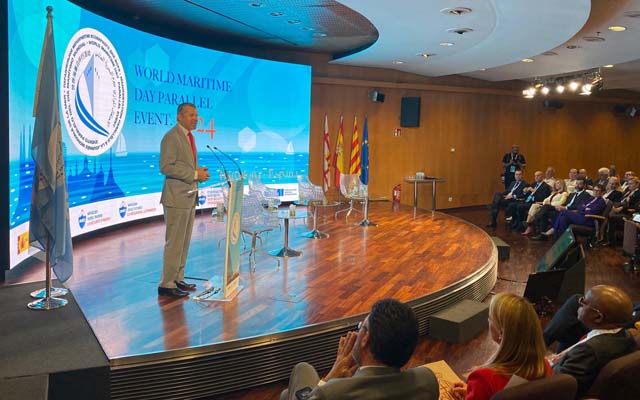At a recent IMO World Maritime Day Parallel Event held in Barcelona, Spain, the focus was on the challenges and opportunities faced by the industry as it undergoes rapid transitions.
IMO’s message was that the drive to decarbonise shipping requires robust safety measures to protect the lives of seafarers dealing with novel technologies and alternative fuels.
IMO Secretary-General Arsenio Dominguez said: “Safe shipping must also be sustainable and compatible with greenhouse gas (GHG) emission reduction targets. Measures to enhance navigational safety, such as using technology to optimise voyage planning with up-to-date weather data, not only improve the safety of ships, but also help to reduce their emissions. We are placing a lot of emphasis on the evolution of our safety regulations, ensuring they focus on seafarers and their training.”
Spain’s Minister for Transport and Sustainable Mobility Oscar Puente, added: “The maritime sector is undergoing a profound transformation, driven by increasing progress in digitalisation, automation and decarbonisation. In this transition towards a more sustainable shipping, it is essential to preserve the competitiveness of the sector as well.”
A series of panel discussions delved into various aspects of the 2024 World Maritime Day theme, ‘Navigating the future: safety first’, including:
- A UN dialogue on maritime safety, featuring the Secretaries-General of IMO Arsenio Dominguez, UN Trade and Development (UNCTAD), Rebecca Grynspan, and World Meteorological Organization (WMO) Celeste Saulo, as speakers
- New and adapted technologies and the introduction of new and alternative fuels
- Ensuring the preparedness of seafarers to navigate the evolving maritime landscape
- How digitalisation and automation are increasingly revolutionising the shipping industry
- Navigating the future of shipping.
Panellists stressed the importance of seafarer training, highlighting that decarbonisation will require new technology, alternative marine fuels, and new skills to handle them safely. Discussions reflected key developments in IMO’s regulatory work, including ongoing negotiations on proposed new measures to reduce GHG emissions from ships, set to be adopted in late 2025, as well as progress towards an overarching IMO digitalisation strategy and a Code to regulate autonomous ships.
To conclude the event, the World Maritime Day Parallel Event flag was presented to the United Arab Emirates, as the host of the next World Maritime Day Parallel Event scheduled for 2025. The theme for 2025 is ‘Our Ocean; Our Obligation; Our Opportunity’.
Image: IMO World Maritime Day parallel event in Barcelona (source: IMO)



